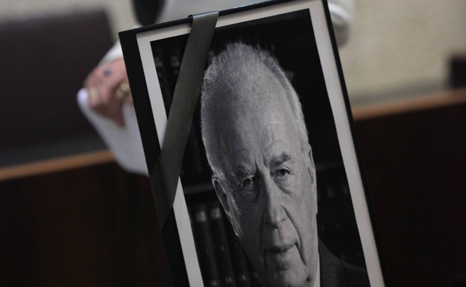Yitzhak’s Blood Cries Out to us from the Ground
Although 25 years have passed since that terrible night - the mourning for a murdered prime minister, assassinated out of political and religious motives, must never fade away and must never be forgotten

Yitzhak Rabin | Flash 90
Twenty-five years have passed since Prime Minister Yitzhak Rabin was murdered. Today, half of all Israelis cannot remember that terrible day. But the other half, those over age 30, certainly cannot forget it. But is the memory of that crime present in our public life? Have its meaning and significance been internalized?
Each and every one of us grieved when he was taken from us. Israelis admired Rabin in part because he was the ultimate sabra, a national hero who led our forces from the War of Independence through the historic victory in the Six Day War, when he served as the IDF Chief of Staff . But over the years, personal grief—even for close relatives—fades, and so too for Yitzhak Rabin, even though he was a great man and died in such tragic circumstances.
But the mourning for a murdered prime minister, assassinated out of political and religious motives, must never fade away and must never be forgotten. The three shots that reverberated in what was then Kings of Israel Square were a thundering wake-up call on the vulnerability of our young identity as a sovereign state, and a reminder that we are treading on very thin democratic ice. A nation’s resilience does not depend solely on its economy and its military, but also on the nature of the relations among the various sectors of society. Though this may not be obvious, the vociferous debates—bemoaned by all —among Israeli society’s different “tribes” bring with it the potential for renewed vitality and new ideas. They can prove to be a powerful positive force , if we are wise enough to conduct them in a tolerant atmosphere, respectful of the most cherished values of the other side—even if we passionately disagree with them. Rabin’s murder exemplifies the horrific outcome of a conflict conducted with no holds barred.
A sober examination of Israeli society today reveals that we have regressed once again to unbridled discord. We are once again demonizing the Other as a criminal and traitor. Extremism has become rampant, not only on the streets, but also in the Knesset. The alarm bells are deafening. . The option of political violence is once again raising its ugly head. We must cry out: Yes, bitter controversy and debate is certainly acceptable; but verbal and physical violence-- absolutely not. Never forget: Yitzhak Rabin’s blood is crying out to us from the ground.
How can we move the memories of the assassination away from the debate between Left and Right? How can we ensure that they evolve into a force for building national resilience and cohesion among all sectors of Israeli society?
Because it is a Jewish state, Israel marks national events according to the Hebrew calendar. The somber atmosphere of Yom Kippur, the colorful joy of Sukkot, the family reunion on Seder night, and the national mourning on Tisha be’Av are evident everywhere. There is only one day—Independence Day—that celebrates Israeli identity per se. But even this holiday is not a festive occasion for a third of the country’s citizens—the Arab and the ultra-Orthodox. We do not have a single civil holiday shared by all; one without any religious, national, or cultural overtones.
Rabin Memorial Day could fill this void, if we transform it into Israeli Citizenship Day. Our day-to-day existence, so pressured and chaotic, emphasizes the differences among us. The conflicts and debates are “in our face” every morning; over and over again, we are flooded by relentless waves of disagreement; . We must to carve out a space and a time in which we can all unite, for one day, and emphasize what all of our tribes have in common. We need a day when we can celebrate the common denominator among all Israelis. Let the fifth of Iyar continue to be the festival of Israeli sovereignty; the twelfth of Heshvan will be the day of shared Israeli citizenship.
The democratic experience can be a rich one, and we should think creatively to highlight its colors and diversity. Our justifiable pride in the fact that we are the only democracy in our region should be celebrated throughout the country on Citizenship Day: in programs in the schools, public ceremonies, special broadcasts, prayers in synagogues, mosques, and churches, and in an annual address by the Prime Minister on the State of Israeli Democracy.
If we can link the trauma of the Rabin assassination to a society-wide process to repair our public failings and ills as proposed here, perhaps future generations “that never knew Yitzhak” will be able to say that Yitzhak Rabin indeed made an immense contribution to Israeli society while alive, but even more so—after his death.
The article was published in Times of Israel.
